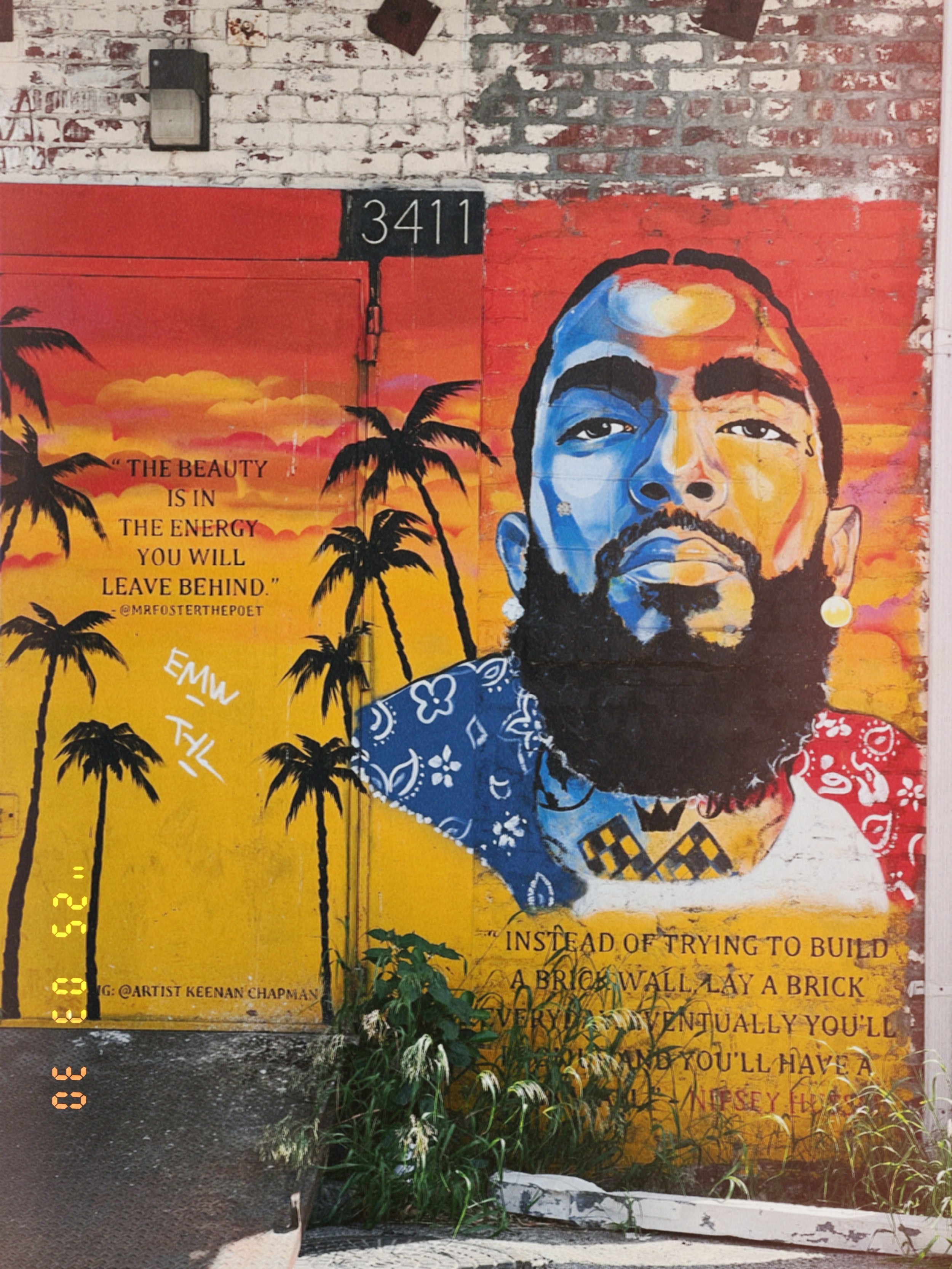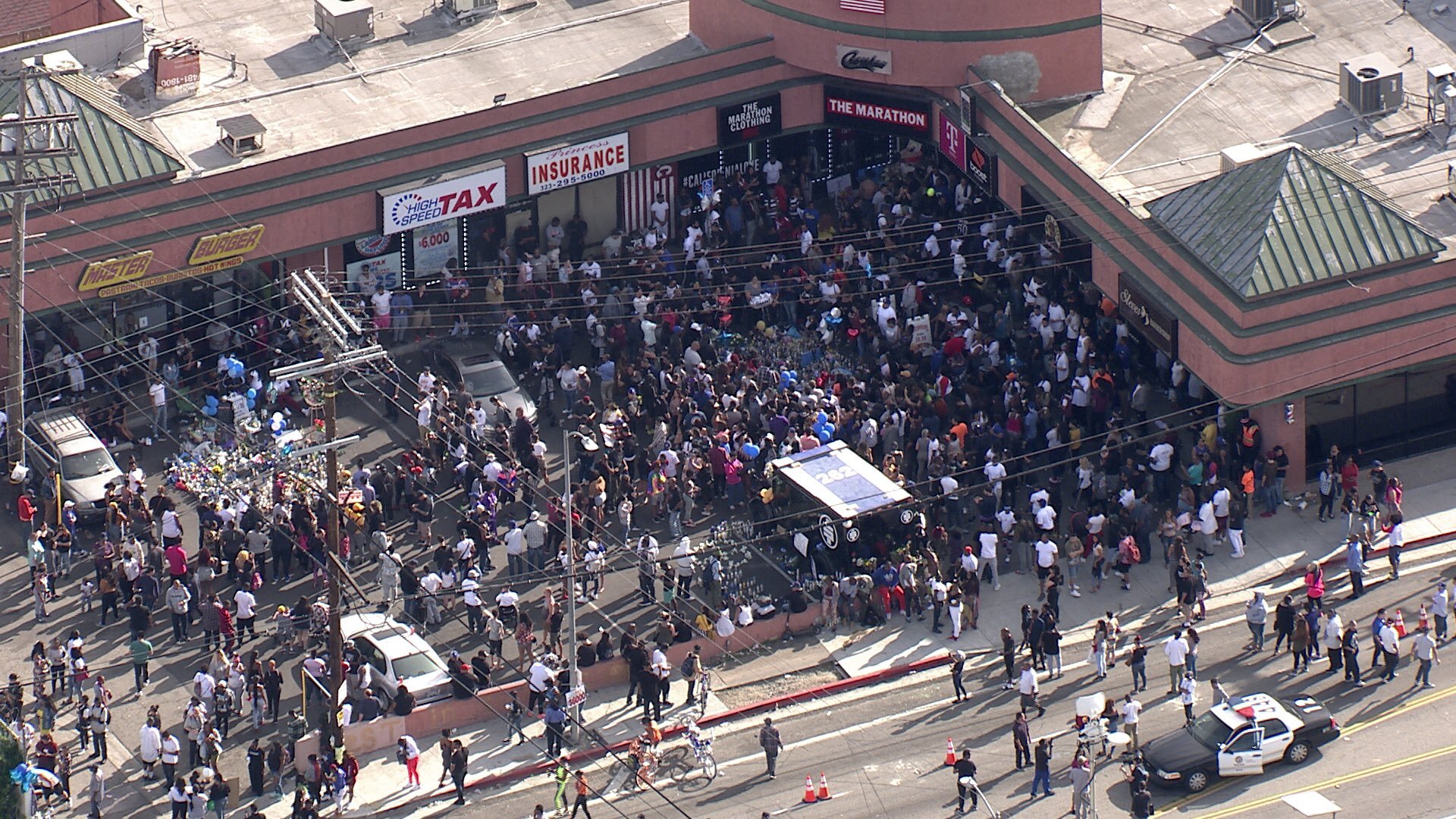The Revolutionary Frequency: Nipsey Hussle, South LA, and the Birth of My Son
“See, there’s a couple ni**as every generation
That wasn’t supposed to make it out, but decode the matrix.
And when they speak, it's like a coded language—
Reminds ni**as of their strength and all the stolen greatness.”
— Nipsey Hussle, Loaded Bases
At the time Nipsey Hussle was killed, I was in Los Angeles—waiting for the birth of my first child.
Leimert Park, South LA — the spirit of the Marathon lives in the streets. (Artist: Keenan Chapman)
My wife was days away from giving birth to our son, and I was navigating one of the most powerful transitions in a man’s life: stepping into fatherhood. But that season didn’t come in quietly. It came with fire.
I was also working to support a comrade from Brazil who was in serious danger. Law enforcement had just conducted an investigation that revealed she was being surveilled by the main suspects (later convicted) of the assassination of Marielle Franco. We were organizing to get her out safely.
That was the headspace I was in—alert, protective, revolutionary.
And then the news broke:
Nipsey had been shot.
I turned on the radio, and Power 106 was already on.
They were talking about it. The energy in their voices said everything.
The whole city felt like it paused.
There was something electric, something charged—like the air itself was carrying a signal.
I felt it in my body.
And I knew—I had to be at Crenshaw and Slauson.
The next day, April 1, I made my way to the site.
Ground Zero of the Marathon
Crenshaw and Slauson, April 1, 2019, the day after Nispey was killed. (photo: CBS LA)
I was driving east on Slauson when the buildup started.
Traffic was thick—cars crawling, people already out on foot.
I took a right turn on Deane, then found a spot somewhere on 59th Street and parked.
From there, I walked in.
As I got closer to Crenshaw and Slauson, the energy thickened.
The streets were full—cars double-parked, people everywhere, posted up, moving slow.
Nip’s voice was already blaring through speakers near the Marathon store, echoing off the walls of the plaza.
Helicopters hovered above. Cameras in the sky.
Candles lined the sidewalk.
The air was heavy, but it wasn’t still.
It was loud. Alive. Charged.
Checc Me Out was playing on repeat:
“Ni**a, fuck it, I came from nothing
Shootouts in public, ridin' buses
Buyin' Benzes, was buyin' buckets
Knock me off of my grind, that's what they wasn't.”
That wasn’t just background noise.
That was the track blaring when I arrived.
It was what was playing—on loop, loud enough for the whole block to feel it.
And it felt right. Like it captured the weight of the moment.
I lit one and took a long pull, standing in the middle of it all.
The smoke curled into the air, blending into the Backwood cloud already hanging over the corner.
Candles flickered low against the concrete.
The color blue—Crenshaw blue, 60s blue—was everywhere.
Faces inked with stories. Teardrops. Scripture.
Some heads bowed. Others held high.
The whole scene was humming with something bigger than grief.
“The Marathon Continues” - Alley way on Crenshaw and Slauson
A Funeral and a Birth
A few days later, I was in the hospital with my wife. She was scheduled to give birth to our first child.
All that week, Nipsey’s music was in rotation. Not just in our home, but throughout the city. His voice was in the air, and it carried something more than rhythm. It carried intention.
On April 9, our son was born.
We were still in the hospital recovery ward when Nipsey’s funeral was held on April 12. While part of me wanted to be there with the people at Staples Center, I knew I was exactly where I needed to be—holding space for new life, while the city honored a fallen king.
Fatherhood activated. My son was born in the days between Nipsey’s passing and memorial.
We named our son Yala Ermias.
Yala, from Kikongo—meaning to rule, and in some dialects, to shine.
Ermias—Nipsey’s birth name—“God Will Rise.”
He entered the world during a moment charged with meaning.
His name wasn’t just a label—it was a timestamp. A portal.
A reflection of a spiritual alignment between departure and arrival.
We wanted him to carry that moment with him forever.
Not just LA.
Not just us.
But legacy.
Sovereignty.
Brilliance.
A Sense of Belonging
Coming from Australia, I was used to the feeling of being visible but not seen.
But in South LA—during that era—it was different.
I was received in a way I had never experienced before.
It was how I was welcomed on the streets. The time I spent in Leimert Park with the community. The handshakes. The daps. The eye contact. The way Black men and women referred to me as “brother”—and it felt real.
There was always music in the air—saxophones, drums, someone spinning vinyl, someone rhyming on the mic.
You could feel the rhythm in your chest, in your step.
It wasn’t just the sound. It was the soul.
And it reminded me that I was somewhere I belonged.
Daily rhythm. Daps. Nods. Truth passed in community time.
Elders would greet me with a nod and a “How you doing, Young King?”
Then they’d start building—talking about the state of the world, how Black people can rise up, how you could elevate your health, your mindset, your consciousness.
Sharing wisdom without pretense—like passing down something they knew you’d need.
Whenever I was in the community with my boys, there was always encouragement.
A kind word. A salute.
The elders would speak life into the fact that I was present, active, showing up as a father.
That mattered.
I found my groove there.
My comfort.
I became a father there.
That whole time, the city was vibrating with Nipsey’s presence.
From Crenshaw to Obama, West Adams, MLK Blvd, Baldwin Hills Crenshaw Mall, Leimert—he was everywhere.
In the barbershops I frequented. In the murals. In the car speakers.
My son would later go to school off Slauson Ave.
I’d drive past Crenshaw and Slauson often—dropping him off, picking him up.
Each time, I’d pay my respects.
Sometimes a moment of silence.
Sometimes a prayer.
Sometimes playing one of Nip’s interviews in the car.
It became part of our rhythm.
A reminder to:
Stay focused.
Stay on your grind.
Build.
Finish what you start.
Roots. Power. Perspective.
The Marathon Frequency
We carried that spirit into the pandemic.
It started with rituals on the beach—gatherings every new and full moon with a group of brothers. That was our sacred space.
We’d pray, meditate, speak affirmations into the wind.
Smoke. Freestyle. Build. Sharpen.
Full moons. New moons. Marathon training. Spiritual alignment.
We tested ourselves physically. We held cyphers in the car park.
The cannabis was part of it—ritual, not recreation.
Nip’s voice stayed with us. His words kept showing up when we needed them.
From those gatherings, we decided to run the LA Marathon.
Literally.
But even that was just surface.
Underneath, we were running a longer race.
As new fathers. As men carrying vision. As builders—
We were running a spiritual marathon.
And we were asking the real questions:
How do we break intergenerational chains?
How do we protect?
How do we lead?
We didn’t let the world shake us.
We stood on our square.
And we reminded each other of who we are.
The Bars That Held Weight
There’s a line from Loaded Bases:
“See, there’s a couple ni**as every generation
That wasn’t supposed to make it out, but decode the matrix…”
When I heard that, it hit deep.
Because I wasn’t just watching history—I was in the middle of it.
I was leading one of the most significant anti-racism campaigns in Australian sport.
A public battle against systemic racism in the AFL and the Collingwood Football Club.
It was national. It was historic.
And I was handling the entire process—virtually, from LA.
There was one moment I won’t forget.
A few lawyers and executives tried to reframe our exchange by invoking the suffering of their own people—positioning it as the ultimate benchmark for pain.
As if that lens was universal.
As if my people’s struggle was somehow beneath theirs.
The philosophy was everywhere—on walls, shirts, benches.
But I was in a different space.
I was a father. Grounded in community.
And from where I stood, their world looked small.
Arrogant.
Audacious.
They didn’t intimidate me.
I recognized the dynamic—how they saw the world, and where they believed they stood in it.
But I wasn’t looking up at them.
I wasn’t seeking validation.
I’d been on a different frequency—one they couldn’t read.
That line from Loaded Bases played in my head like a baseline:
“Got the sharks that I’m sittin’ at this table with afraid to bait me…”
And that’s exactly what it felt like.
They saw it in me.
That I didn’t fear them.
That I didn’t place them above me.
That I wasn’t theirs to shape.
The Closing Frequency
This moment.
This music.
This man.
It didn’t end anything.
It shifted everything.
A new rhythm.
A new frequency.
One that my son was born into.
And one I’m still carrying forward.
The Marathon Continues.












